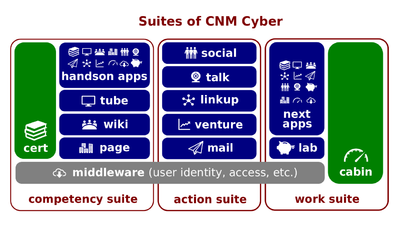Difference between revisions of "What Test Case Is"
(→Closing) |
|||
| (8 intermediate revisions by 2 users not shown) | |||
| Line 1: | Line 1: | ||
| − | [[File:Cnm-digital.png|400px|thumb|right|[[ | + | [[File:Cnm-digital.png|400px|thumb|right|[[CNMCyber suite]]s]][[What Test Case Is]] (hereinafter, the ''Lectio'') is the [[lectio|lesson part]] of '''[[Manual Testing Essentials]]''' [[lesson]] that introduces its participants to [[manual testing]] concepts. This ''lesson'' belongs to the ''CNMCT Entrance'' section of the [[CNMCyber Bootcamps]]. |
| Line 8: | Line 8: | ||
:The English word, [[case]], originally derived from a Latin [[noun]] ''casus'' that meant an ''accident, event, occurrence; occasion, opportunity''. A [[test case]] is a set of [[requirement]]s for particular [[testing]]. | :The English word, [[case]], originally derived from a Latin [[noun]] ''casus'' that meant an ''accident, event, occurrence; occasion, opportunity''. A [[test case]] is a set of [[requirement]]s for particular [[testing]]. | ||
| − | :In [[systems engineering]], a | + | :In [[systems engineering]], a [[functional test case]] commonly specifies the inputs, external factors, available assets, procedures, and expected outputs that the tested system shall produce. Having that specification, the [[tester]] who administers the [[product work test]] can evaluate whether the tested system achieves the objectives it has been designed to achieve. |
:Not all ''performance cases'' must be highly detailed. For instance, one [[performance test case]] for this very [[lectio]] can be:<blockquote><code>Evaluate whether the closing question of the lectio reflects the brief lecture that this lectio includes.</code></blockquote> | :Not all ''performance cases'' must be highly detailed. For instance, one [[performance test case]] for this very [[lectio]] can be:<blockquote><code>Evaluate whether the closing question of the lectio reflects the brief lecture that this lectio includes.</code></blockquote> | ||
| − | |||
| − | |||
| − | |||
| − | |||
:''Test cases'' for [[usability testing]] are rarely detailed; they tend to be more general than those for ''performance testing''. A simplest example of a [[usability test case]] can be,<blockquote><code>While using the tested system, report if you feel uncomfortable, get confused, or even start thinking what to do next.</code></blockquote> | :''Test cases'' for [[usability testing]] are rarely detailed; they tend to be more general than those for ''performance testing''. A simplest example of a [[usability test case]] can be,<blockquote><code>While using the tested system, report if you feel uncomfortable, get confused, or even start thinking what to do next.</code></blockquote> | ||
| Line 21: | Line 17: | ||
===Key terms=== | ===Key terms=== | ||
| − | :[[Test case]], [[case]], [[ | + | :[[Test case]], [[case]], [[functional test case]], [[performance test case]], [[usability test case]] |
===Closing=== | ===Closing=== | ||
| − | : | + | :Write True or False |
| + | :*[[Regression testing]] is quite feasible for [[Usability testing]]. | ||
The successor [[lectio]] is '''[[What Reporting Is]]'''. | The successor [[lectio]] is '''[[What Reporting Is]]'''. | ||
Latest revision as of 02:54, 21 October 2023
What Test Case Is (hereinafter, the Lectio) is the lesson part of Manual Testing Essentials lesson that introduces its participants to manual testing concepts. This lesson belongs to the CNMCT Entrance section of the CNMCyber Bootcamps.
Content
The predecessor lectio is Verification vs Validation.
Script
- The English word, case, originally derived from a Latin noun casus that meant an accident, event, occurrence; occasion, opportunity. A test case is a set of requirements for particular testing.
- In systems engineering, a functional test case commonly specifies the inputs, external factors, available assets, procedures, and expected outputs that the tested system shall produce. Having that specification, the tester who administers the product work test can evaluate whether the tested system achieves the objectives it has been designed to achieve.
- Not all performance cases must be highly detailed. For instance, one performance test case for this very lectio can be:
Evaluate whether the closing question of the lectio reflects the brief lecture that this lectio includes.
- Test cases for usability testing are rarely detailed; they tend to be more general than those for performance testing. A simplest example of a usability test case can be,
While using the tested system, report if you feel uncomfortable, get confused, or even start thinking what to do next.
- Regression testing for user experience improvements is not feasible; all of usability testing is in the progression testing category.
Key terms
Closing
- Write True or False
- Regression testing is quite feasible for Usability testing.
The successor lectio is What Reporting Is.
